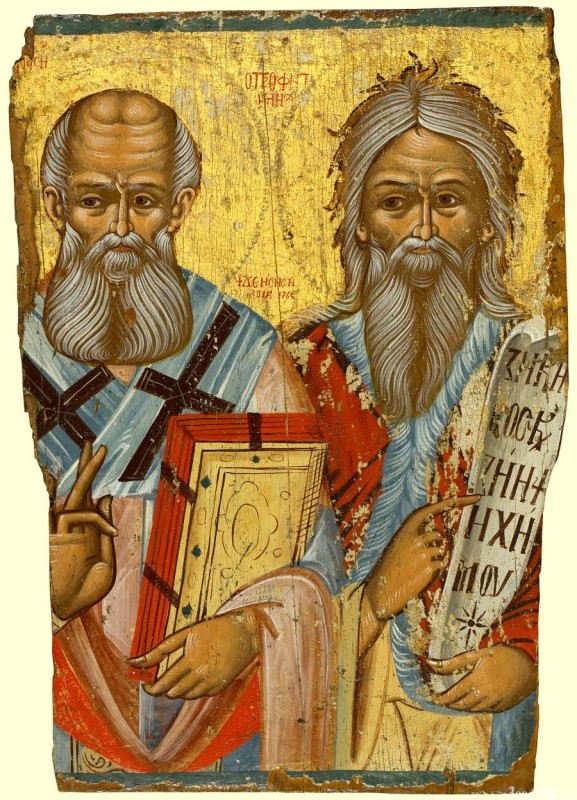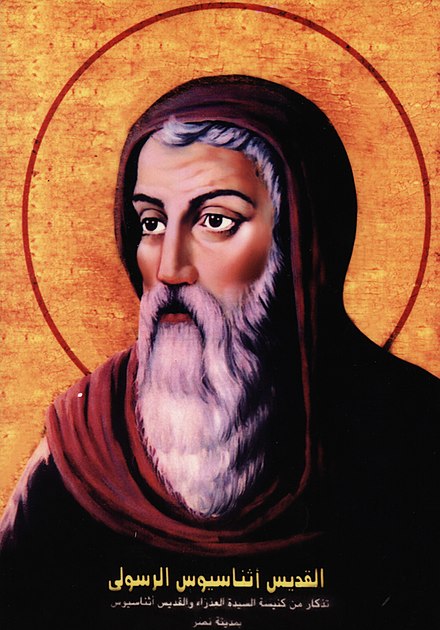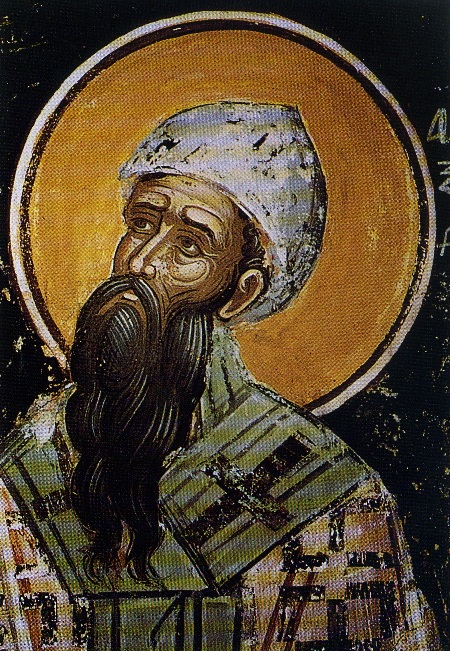
Matthew 28:16-20 (Matins)
Hebrews 13:7-16
Matthew 5:14-19
My Brother and My God
For here we have no continuing city.
In the Name of the Father and of the Son and of the Holy Ghost. Amen.
|
Our faith is about family.
Our word familiar is related.
What could be more familiar?
For family is common to nearly all of us,
and
nothing is nearer to many of us throughout our lives.
It is familiar to us
yet not at all familiar;
a family,
yet
a most royal family about which we can
assume nothing.
As the teenage Ever-Virgin Mary might say,
King of kings, most Holy One,
God and Son Eternal One,
You are my God and helpless Son,
High Ruler of mankind.
("Christ-child Lullaby," Trad. Hebrides carol)
|
And we, the adopted children of God, might say,
"My Brother and My God."
Until this time, and ever since, no revelation of God had been, or has been, anything like this:
a Divine relationship among intimate familiars.
Christianity is not a theory.
It is not an immersion in profound books.
It is an encounter,
an encounter with our only true Father, His Only-begotten Son, and each other,
who are God's adopted children.
As in any royal family,
we recognize that the First-born,
Father God's only "natural issue,"
to be the Heir, the Prince, the One before Whom we bow, even kneel, in reverence.
For most us this will be a novel aspect of family,
but not a novelty to royalty.
Jesus, of course,
revealed this family faith to us.
Throughout the Gospel of St. Matthew,
and I heard it just a moment ago in our Gospel reading today,
He is apt to use the phrase,
"My Father in Heaven":
"For whoever does the will of My Father in Heaven is My brother
and sister and mother."
(Mt 12:50)
|
Here is a new kind of family, indeed.
So we may not wonder why mature, devout Jewish men
who had been praying all their lives would ask,
"How are we to pray, then?"
Jesus famously answered,
"When you pray, say this:"
Πατερ `ημων `ο εν τοις ουρανοις
(Pater hmwn en tois ouranois)
"My Father Who art in the Heavens ...."
|
"My Father Who are in Heaven."
The first two words say it all.
"My Father ...."
In St. Luke's Gospel we read that we are to call out or cry out, "Father!"
St. Paul wrote
And because you are sons, God has sent forth the Spirit of His Son into
your hearts, crying out, "Abba, Father!" (Gal 4:6)
.... you received the Spirit of adoption by whom we cry out, "Abba, Father." (Rom 8:15)
|
"Abba!"
This is familiar address,
the sort of thing only shared among family members.
It is interesting that St. Paul should phrase it this way:
we must not presume to declare this through our own humble capacities;
it is only through the Holy Spirit that we durst say,
"Papa!"
Here is the beginning and end of our faith.
The God of the Universe is not only "Father";
He is for each of us, Jesus insists, "My Father."
Now, here is a mystery known to every child born into the world:
our mother or father may well be the parent of many,
yet she or he is my special one .... the most special one.
God is your Father and my Father and the Father of us all.
As St. Paul wrote,
.... one Lord, one faith, one baptism; one God and Father of all,
Who is above all, and through all, and in you all.
(Eph 4:5-6)
|
And with these words we are received into the most intimate relationship imaginable:
in you all,
one flesh and bone with His Son, the God-man.
We are
the adopted child of Our Father in Heaven.
This is the faultless teaching of Jesus, of the Apostles, and of the Early Church Fathers.
Ours is a faith, above all, of family.
And Jesus is "One with the Father,"
so we,
God's adopted sons and daughters,
are also to become One with the Father
following the perfect example of the First-born of Creation (Col 1:15).
He shows us the way to God
—
in His human and Divine nature
and
in His every gracious word and motion.
To some Christians, this may seem audacious,
even impious, for it seems to reach too high,
seems to claim too much.
But I invite all those who affirm their faith in the Nicene Creed
to
consider that the Holy Trinity, Whom we worship and adore,
is composed of a Person Who is fully human
as well as
fully Divine.
For Jesus continues to be the God-man
as the Apostles discovered when the Risen Christ appeared to them,
continuing to bear His wounds;
continuing in His flesh and body, which they touched;
and
continuing to enjoy food and dine with them.
That is,
the Most Holy Trinity Itself is interwoven with human nature.
To other Christians,
this may seem, not audacious nor impious at all,
but rather familiar.
After all,
family is something they know about.
And their response is not so much a fear of impiety,
but rather the opposite:
a temptation to be too lax.
Surely,
we see this effect in our own culture
today,
where young people are encouraged to see Jesus as their pal,
their buddy,
the one who "has their back."
This effect was also seen during the early centuries of Christian history.
Many Christians,
even the majority at one point,
sought
to deprecate Jesus,
to demote Him,
to suggest that He is less than God.
In particular, a priest who had become a celebrity of his time named Arius
had developed an enormous, multi-national following of Christians who adopted his point of view
—
"Jesus the Christ was less than God."
Arius was a good-looking and witty cultural "rock star" (we would say)
—
a kind of
"Internet celebrity."
Women sought him out.
Men wanted to be seen with him.
His clever and glib language never failed to delight his adoring fans.
"Jesus having the same substance as the Father?!"
he would ask in mock surprise.
"No!"
|
"Not Homoousiois but Homoiousios!"
|
suggesting archly that his "dim-witted detractors" suffered from no more than a
case of poor spelling.
He had distilled his entire argument down to a "bumper sticker" (we would say),
and
this clever one-liner rapidly
spread throughout the Christian world.
The effect of it, however, went far beyond the bounds of party gaiety
or
clever posturing.
It was blasphemy,
even apostasy,
as it was an affront to God
and
a refusal of His Once-for-all Self-revelation.
On the one hand,
homoousios ("same substance") asserted Christian orthodoxy
—
that
Jesus was One with the Father.
On the other hand,
homoiousios asserted that in some mysterious way Jesus was similar to the Father
but not united, not one-and-the-same
as Jesus had often affirmed.
But, you know, people love what "trends" socially,
what "goes viral."
They love be "in the know,"
to be seen with the "smart set."
And before long,
during the period from around 320 to 380 A.D.,
a majority of Christians
adopted the Arian point of view as their own.
 Perhaps no one strove more mightily against the Arian tide than St. Athanasius the Great,
called "a pillar of the Church" by St. Gregory the Theologian.
Athanasius was a deacon when Arius, a priest of the same diocese,
came into theological conflict with his bishop,
Alexander,
the Patriarch of Alexandria.
On his death-bed,
with the Arian conflagration burning out of control,
the Patriarch
called the young Athanasius to his private rooms imploring the young man
to accept election as Patriarch of Alexandria.
In his biography of Athanasius, Frances A. M. Forbes wrote,
Perhaps no one strove more mightily against the Arian tide than St. Athanasius the Great,
called "a pillar of the Church" by St. Gregory the Theologian.
Athanasius was a deacon when Arius, a priest of the same diocese,
came into theological conflict with his bishop,
Alexander,
the Patriarch of Alexandria.
On his death-bed,
with the Arian conflagration burning out of control,
the Patriarch
called the young Athanasius to his private rooms imploring the young man
to accept election as Patriarch of Alexandria.
In his biography of Athanasius, Frances A. M. Forbes wrote,
|
When the Bishops of the Church
[of Alexandria]
assembled to elect their new Patriarch,
the whole Catholic population surrounded the church, holding up their hands to Heaven
and crying, 'Give us Athanasius!'"
|
The reluctant Athanasius finally acceded to their wishes and took arms against
a whole world that would oppose him,
giving rise to the title by which we know him best: Contra Mundum,
"Athanasius Against the World."
Eventually, he would be driven out of the See of Alexandria by his Arian opponents
and
was received
in the Egyptian desert
by St. Anthony the Great,
whose feast we celebrated yesterday.
 In time,
and due to the exertions and sacrifices of St. Athanasius,
the Catholic faith would prevail over Arianism.
Yet,
in the succeeding century
another heresy arose similar to Arianism.
As with Arianism,
a kernel of truth
—
that Jesus is our Elder Brother,
—
was demeaned in such a way as, yet again, to deprecate and demote the God-man.
Yet again,
clever language would "go viral" with the fickle multitude.
This time, the heresy would be carried forward by
no less than
the Ecumenical Patriarch,
the Archbishop of Constantinople,
Nestorius,
who
pronounced
that
Ever-Virgin Mary was
In time,
and due to the exertions and sacrifices of St. Athanasius,
the Catholic faith would prevail over Arianism.
Yet,
in the succeeding century
another heresy arose similar to Arianism.
As with Arianism,
a kernel of truth
—
that Jesus is our Elder Brother,
—
was demeaned in such a way as, yet again, to deprecate and demote the God-man.
Yet again,
clever language would "go viral" with the fickle multitude.
This time, the heresy would be carried forward by
no less than
the Ecumenical Patriarch,
the Archbishop of Constantinople,
Nestorius,
who
pronounced
that
Ever-Virgin Mary was
|
Not Theotokos, but Christotokos!.
|
sending yet another "bumper sticker" out into the world.
Nestorius asserted that Ever-Virgin Mary
had not given birth to God,
but, rather,
that she had given birth to the Christ, a man.
Getting into the details,
Nestorius argued that in the God-man we find not one Person with two natures,
but
rather two distinct Persons:
one human and the other Divine.
As the world had collided with a Patriarch of Alexandria in the mid-fourth century,
so
the Ecumenical Patriarch would collide with a Patriarch of Alexandria in the mid-fifth century
—
St. Cyril,
to be called "Pillar of the Faith."
St. Cyril explained
that to accept two Persons in the God-man, Jesus Christ,
would be
to confound the Incarnation.
It is only in Jesus being truly God and truly human in one and the same Person
that
we might become the adopted children of God.
In this alone do we find our birthright and our path to Heaven.
If the Son of God had merely been a Divine visitor and not one of us,
then
we are lost and Earth-bound and unable to be united with God the Father as Jesus had done (and does).
Only in One Person, Divine and human,
can we find our our precious gift of
Theosis.
No!
Cyril loudly declared.
Our Most Holy Mother and Queen is the Theotokos,
who truly and really gave birth to God,
Who is mysteriously united to human nature:
two hypostases in One Person,
One Person having two natures,
both human and Divine,
the Hypostatic Union.
And in this is our own nature revealed:
a Divine soul mysteriously set within a human animal.
We may seek union with either one.
But to be Christian one must claim
the Divine part.
This is the "one thing that is needful" (Lu 10:32).
As we read in our Epistle lesson this morning,
|
Here we have no continuing city, but we seek the one to come. (Heb 13:14)
|
We have no continuing city here, for the dog to which the immortal soul is lashed will die.
The people have imagined a vain thing (Ps 2:1)
hobbling the faith worldwide.
In their lax familiarity, people supposed
that Jesus is not much more than
their Brother,
a man and no God.
But do we not always diminish ourselves, our Church, and our world
whenever we seek to make God too familiar?
Young Christians today are taught that Jesus is their equal and familiar
.... and then go on to live lesser lives,
lives that equals might tolerate, but God can never accept.
God asks,
|
"Do you imagine that I am just like you?" (Ps 50:21)
|
No!
Our lives depend upon the opposite principle:
|
We are to become just like Him.
|
And our continuing city is not here, but rather it is Heaven's Kingdom.
In the Name of the Father and of the Son and of the Holy Ghost.
 Perhaps no one strove more mightily against the Arian tide than St. Athanasius the Great,
called "a pillar of the Church" by St. Gregory the Theologian.
Athanasius was a deacon when Arius, a priest of the same diocese,
came into theological conflict with his bishop,
Alexander,
the Patriarch of Alexandria.
On his death-bed,
with the Arian conflagration burning out of control,
the Patriarch
called the young Athanasius to his private rooms imploring the young man
to accept election as Patriarch of Alexandria.
In his biography of Athanasius, Frances A. M. Forbes wrote,
Perhaps no one strove more mightily against the Arian tide than St. Athanasius the Great,
called "a pillar of the Church" by St. Gregory the Theologian.
Athanasius was a deacon when Arius, a priest of the same diocese,
came into theological conflict with his bishop,
Alexander,
the Patriarch of Alexandria.
On his death-bed,
with the Arian conflagration burning out of control,
the Patriarch
called the young Athanasius to his private rooms imploring the young man
to accept election as Patriarch of Alexandria.
In his biography of Athanasius, Frances A. M. Forbes wrote,
 In time,
and due to the exertions and sacrifices of St. Athanasius,
the Catholic faith would prevail over Arianism.
Yet,
in the succeeding century
another heresy arose similar to Arianism.
As with Arianism,
a kernel of truth
—
that Jesus is our Elder Brother,
—
was demeaned in such a way as, yet again, to deprecate and demote the God-man.
Yet again,
clever language would "go viral" with the fickle multitude.
This time, the heresy would be carried forward by
no less than
the Ecumenical Patriarch,
the Archbishop of Constantinople,
Nestorius,
who
pronounced
that
Ever-Virgin Mary was
In time,
and due to the exertions and sacrifices of St. Athanasius,
the Catholic faith would prevail over Arianism.
Yet,
in the succeeding century
another heresy arose similar to Arianism.
As with Arianism,
a kernel of truth
—
that Jesus is our Elder Brother,
—
was demeaned in such a way as, yet again, to deprecate and demote the God-man.
Yet again,
clever language would "go viral" with the fickle multitude.
This time, the heresy would be carried forward by
no less than
the Ecumenical Patriarch,
the Archbishop of Constantinople,
Nestorius,
who
pronounced
that
Ever-Virgin Mary was